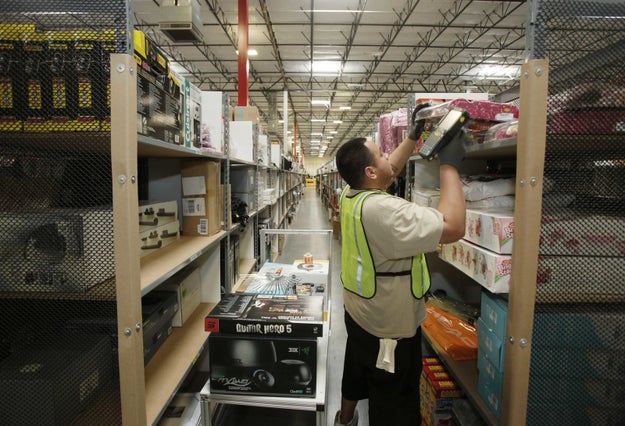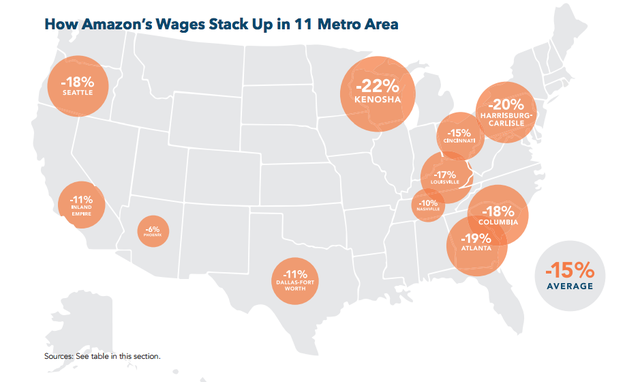
Shipment picker Marcus Marintez of Phoenix pulls items for shipment inside the 800,000 sq. ft. Amazon.com warehouse in Goodyear, Arizona.
Ross Franklin / AP
President-elect Donald Trump was quick to take part of the credit for Amazon’s announcement this week that it will create 100,000 new jobs in the US in the next 18 months.
Amazon has not confirmed whether the job creation is the result of a conversation with Trump, who last spring falsely called the e-commerce giant a “huge antitrust problem.” He also accused CEO Jeff Bezos of manipulating coverage by the Washington Post, which he owns, to his advantage. Bezos was among the tech titans who met with Trump last month.
One hundred thousand new jobs would be a coup for Trump, who has spent the weeks leading up to his inauguration talking about efforts by companies like Carrier and Sprint to keep manufacturing jobs in the US. For a figural comparison, Japanese billionaire Masayoshi Son told the incoming president that he planned to invest $50 billion in the US economy, a massive sum that he says will result in just 50,000 new jobs. But while Amazon’s planned growth is impressive, whether those jobs end up being good for the economy is debatable.
“Many of these jobs will be low-paid, short-term, and have high turnover. Some will be temporary positions,” said Stacy Mitchell, co-director of the Institute for Local Self-Reliance, a research and advocacy group focused on stimulating local economies. “Those are not the kind of jobs we need in order to address the economic challenges that so many Americans are facing.” (In its press release, Amazon said all 100,000 new positions will be “full-time, full-benefit” jobs.)
Earlier this year, Mitchell — who literally wrote the book on the negative impacts big-box stores have on communities — co-authored a report on Amazon about the kinds of jobs it creates and the kinds of jobs it destroys. As the New York Times reported Friday, for every position Amazon fills, a greater number of traditional retail jobs are eliminated, undercutting the company’s job creation claims.
But even if the warehouse and delivery jobs Amazon generates are replacing retail jobs at brick-and-mortar shops and department stores, the quality of the jobs isn’t necessarily the same. And what Mitchell has to say about the working conditions for many Amazon workers does not sound good. (Mitchell’s insights on working conditions at Amazon comes from original interviews with warehouse workers and labor organizers, as well as extensive previous reportage from news outlets including Mother Jones, the Seattle Times, and The Morning Call.)
“Amazon’s warehouses are very finely tuned machines and the company organizes the human labor to be parts of the machine,” Mitchell said. “So the tasks are highly repetitive, and they are physically demanding. In warehouses that haven’t been automated yet, it involves running across warehouses that are multiple football fields in size to pick items.”
The report also describes the experience of employees who had to kneel on the ground hundreds of times a day, and a job posting that says employees must be able to lift up to 49 pounds in temperatures of up to 90 degrees. But Mitchell said, in researching Amazon, what struck her most was the psychological stress to which even Amazon’s lowest-paid workers were exposed.
“Amazon consistently sets the performance goals above what people can actually achieve,” Mitchell said. “You’re always racing and running and falling behind and, among other things, not only does it make you do more, but it makes you demoralized, and less likely to speak up or join with your fellow workers in speaking up about working conditions.”
On top of all that, Mitchell’s report also found that Amazon paid its warehouse workers less to do these unpleasant jobs than comparable employers paid theirs. Comparing Amazon hourly wages found on Glassdoor to Bureau of Labor Statistics data, Mitchell found that in 11 markets where Amazon is currently active, Amazon wages were on average 15% lower than the prevailing wage for warehouse workers; in Atlanta it was 19% less, while in Phoenix it was 6% less.
Wages submitted to Glassdoor are anonymous and therefore difficult to fact-check, but Mitchell said the data, which she only pulled from markets with a significant volume of submissions, was corroborated by job postings and staffing agency listings.
In a statement, an Amazon spokesperson said that its fulfillment center employees earn 30% more than retail workers typically do and that the company is "proud of the work environment and the culture we have at Amazon.”
Amazon prefers to compare the wages it pays fulfillment center employees to prevailing wages in the retail industry. Retail work, because it’s less physically demanding, is typically lower paid than warehouse work.

Institute for Local Self-Reliance / Via ilsr.org
While more jobs are generally good news, for low-skill workers, Mitchell thinks the fact that Amazon pays comparatively low wages despite its dominance of the online retail market is definitely a cause for concern, especially in communities where a decline in manufacturing has led to high unemployment.
“There’s a lot of economic research that suggests the biggest problem facing the US economy is not so much lack of jobs, but that the jobs we do have pay too little,” she said. “This is more of the same.”
In Amazon’s press release announcing the new jobs, the company details the unusually generous benefits it offers entry-level workers, including subsidized job training, retirement savings and stock options, and a generous 20-week parental leave program for all parents. Though the company’s release focuses on fulfillment centers, some of the new positions Amazon creates in the next 18 months will be white-collar jobs in fields like AI and cloud services.
from BuzzFeed - Tech https://www.buzzfeed.com/carolineodonovan/those-100000-new-amazon-jobs-might-not-be-good-for-everyone?utm_term=4ldqpia
No comments:
Post a Comment